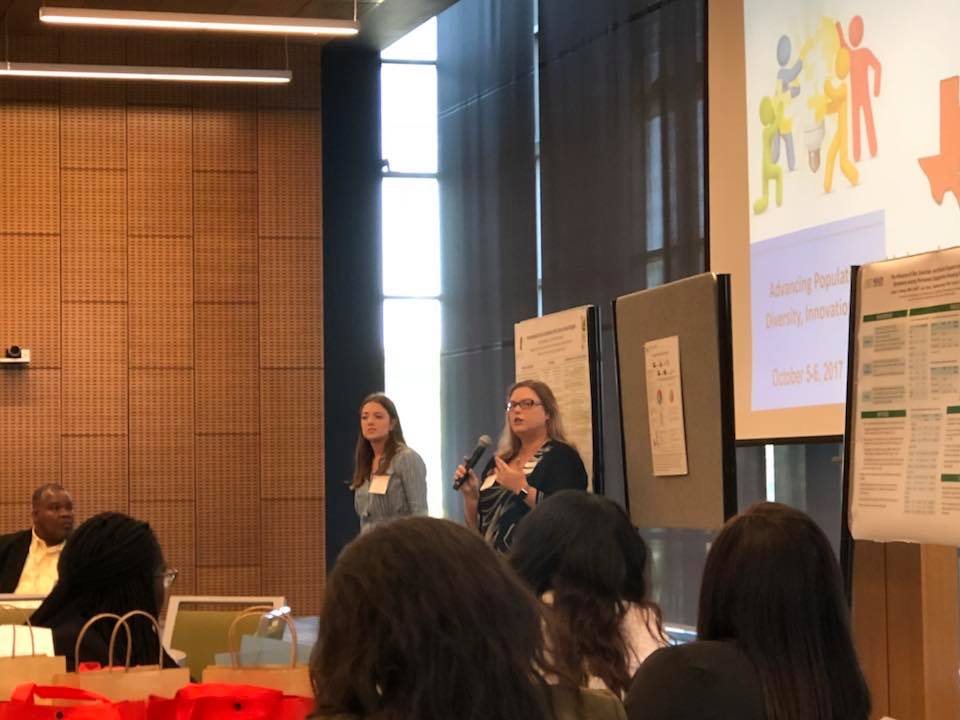Is the environment to blame for your food allergy?
Erin Benton presenting her research at the 2017 Texas Society for Public Health Education Annual Conference in Waco, Texas.
Erin Benton, a second-year Master's of Public Health student, is no stranger to food allergies. Erin, along with her father and brother, have all experienced at least one food allergy in their lifetime. Though she considered genetics a reason for her family's food allergy susceptibility, Erin considered other causes for these all too common afflictions. Why didn't her mom experience a food allergy? Why are some people born with allergies, while others develop them later in life? Are food allergies an emerging public health issue?
During her first semester of graduate school, Erin took an environmental health course taught by The Sayes Group founder, Dr. Christie Sayes. After listening to a lecture about how the environment has been associated with the onset of celiac disease (i.e. an immune reaction to eating gluten, a protein found in wheat, barley, and rye), Erin felt inspired to further investigate the correlation between the environment and the onset of food allergies. She collaborated with Dr. Christie Sayes to write and publish a journal article in order to define the role of the environment as it relates to food allergies.
Key findings from their research:
- Food allergies diagnosed often appear in children under the age of three.
- Children tend to have more than one food allergy present at a time.
- People diagnosed are shown to have the following similarities: manifest symptom(s) at age < 20 years old, reside in industrialized environments, inflicted with predisposing health sensitivities, and originating from developed countries.
- Environmental factors that can play a role in food allergies include: ethnicity and genetics, weight, exposure to air pollution and sunlight, asthma or eczema.
- Highly urbanized areas, air pollution and food surplus will contribute to the growing environment-food allergy nexus.
- The most cited adverse human health outcomes include multiple allergies, psychological effects, and death.
- There are currently no proven methods to overcome a diagnosed food allergy, but there are known ways to overcome a sensitivity related food illness.
- Environmental factors contribute to the onset of food allergies; therefore, this epidemic could be labeled as an emerging public health issue.
You can access the journal article here: Benton EN and Sayes CM. (2017). “Environmental Factors Contribute to the Onset of Food Allergies”. Journal of Environmental Science and Public Health 1(1):35-55. Open Access (http://www.fortunejournals.com/articles/environmental-factors-contribute-to-the-onset-of-food-allergies.html).
Erin Benton (left) and Dr. Christie Sayes (right) presenting at the 2017 Texas Society for Public Health Education Annual Conference in Waco, Texas.
After publishing their paper, Erin and Dr. Sayes presented their research on environmental factors contributing to the onset of food allergies at the 2017 Texas Society for Public Health Education (TSOPHE) Annual Conference in Waco, Texas. This year's TSOPHE conference focused on public health education topics relating to the advancement of population health through diversity, innovation, and collaboration. Dr. Sayes and Erin presented their research to a group of public health professionals from all over the state of Texas. Their work serves as an example of a successful collaboration between two professional sectors (i.e. public health and environmental science) to achieve a common goal (i.e. risk factors of food allergies).
Erin is expected to graduate from Baylor University with her MPH in May 2018. She plans to pursue a Ph.D. in Health Education and Behavioral Sciences and continue to teach health education. Her research interests include sexual health and the risk factors of food allergies.



